2018 BMW X5 review, test drive
The fourth-generation X5 is bigger, bolder and far better equipped. We take it for a quick spin to see just how grown up it is.
Published on Sep 27, 2018 12:09:00 PM
21,146 Views
Follow us on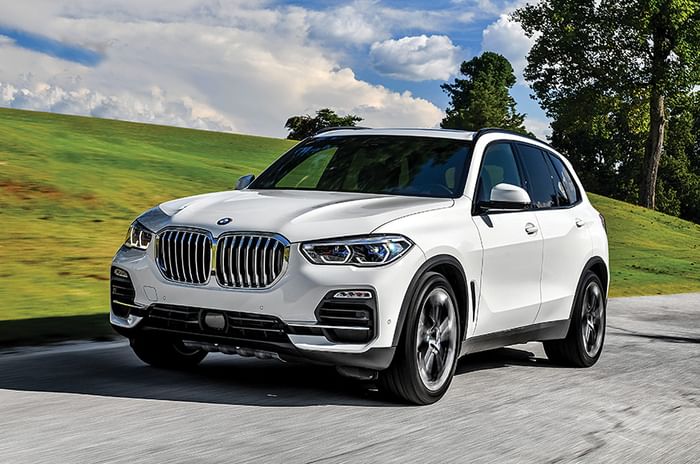
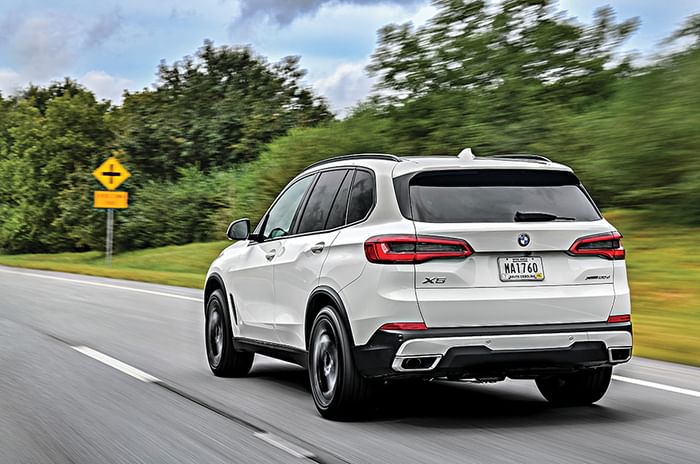
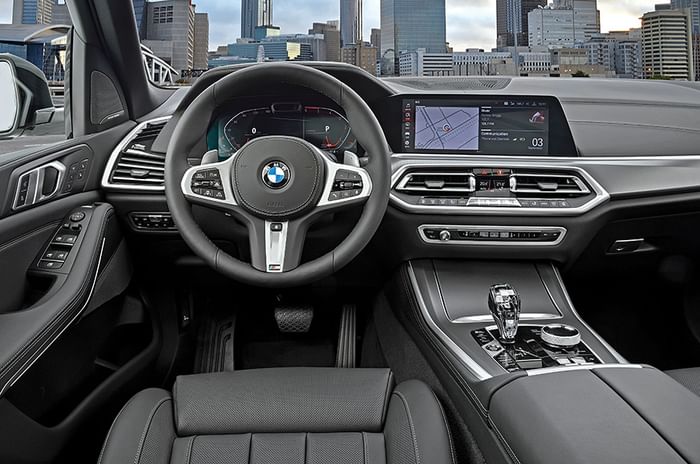
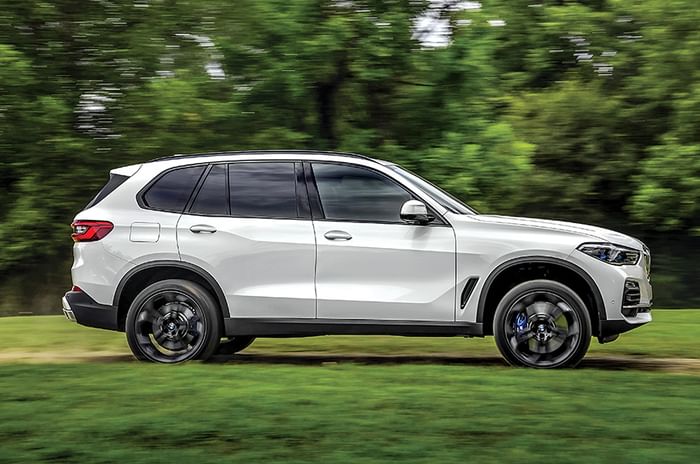
Ride comfort is brilliant, thanks to air suspension all round.
The X5 is BMW’s first SUV and also its most successful one, clocking sales of over 2.1 million since its international debut in 1999. In India, the X5 first arrived only
with the launch of the second-generation model. But now, BMW doesn’t want to waste any time and is all set to launch the latest, all-new SUV in the Indian market by the middle of 2019, a mere six months after its international debut.
The new X5 couldn’t come a day too soon, as the current model – now a bit long in the tooth – is under assault from fresher and stronger competition like the swift and nimble Audi Q7 and the lavishly comfortable Volvo XC90. Land Rover and Jaguar too are usurping X5 customers with their new offerings, and let’s not forget Mercedes – which, in India, probably sells more SUVs than any luxury car brand.
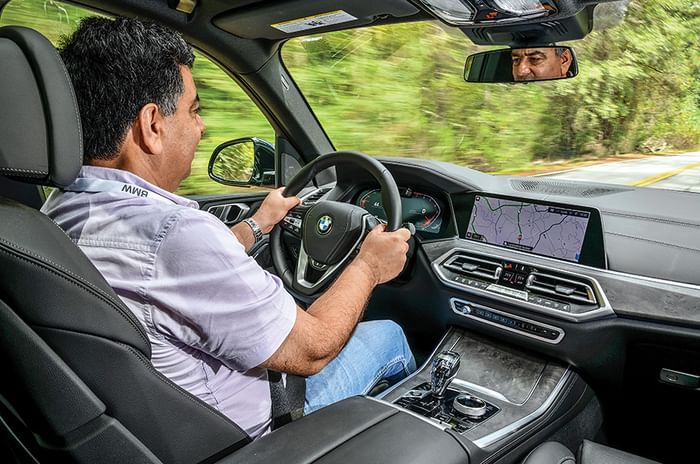
The new X5 then has a big job to do. It has to be a notch ahead in every parameter to claw back lost ground and impress a new generation of luxury SUV buyers. That means not just playing to the traditional strengths of the BMW brand but also being more of an all-rounder.
| BMW X5 Price, Mileage, Specifications, Features and Variants | |
|---|---|
| Brand | BMW |
| Model Name | X5 |
| BMW X5 Price | ₹ 1.10 - 1.28 crore |
| BMW X5 Range/Mileage | Petrol : 12kpl | Diesel : 12kpl |
| BMW X5 Specifications | SUV | 5 doors | 5 seats View All Specs |
| BMW X5 Features | Laser and LED headlight | 14.9-inch Touchscreen display | 8 airbags View All Features |
| BMW X5 Variants | 3.0 Petrol xDrive40i xLine | 3.0 Diesel xDrive30d xLine | 3.0 Petrol xDrive40i M Sport View All Variants |
BRING ON THE BLING
Having enlarged kidneys isn’t good for your health but BMW thinks otherwise and has blessed the X5 with the largest iteration of its trademark kidney grille yet (until the X7 hits the road). The massive, vertical grille is more in-your-face than sporty and sets the tone for the rest of the car, which has expanded in every dimension. Size matters in the SUV world, especially in the United States, which is not only the home of the X5 (it’s made only in Spartanburg) but also its largest market. Not surprising then that the new X5 has been designed with Americans in mind. America is an XL-sized country with big people having big wallets, travelling big distances in big cars. China too is a country that likes big cars and is also a huge market for the X5. Moreover, today’s SUV buyers like to be pampered and give top priority to comfort and convenience.
Having ingested all these inputs, BMW has put luxury, comfort, and practicality at the forefront with this fourth-gen model. But has that come at the cost of sportiness, the core attribute that defined the original X5?
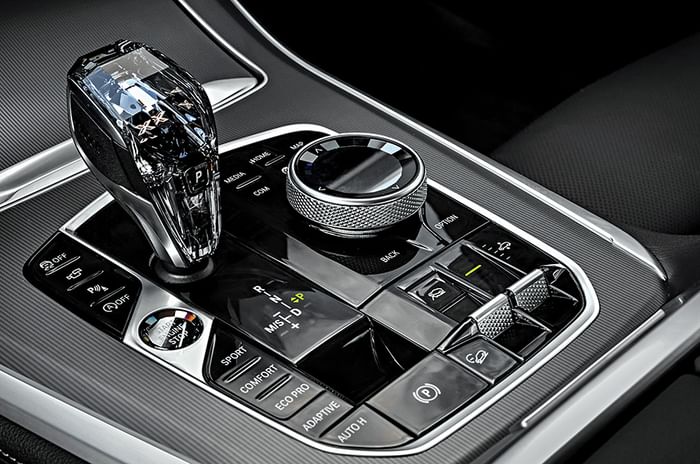
The good thing is that the design hasn’t strayed too far from the previous car. Muscular wheel arches, a tautly skinned body and some interesting details, like the side body crease that rises above the rear wheels, retain the X5’s athletic looks. The new LED/laser headlights look straight out of Star Wars and the chunky rear lamps are quite striking too. And to round off the suited and booted look, our test X5 gets fat tyres on the 21-inch wheels. 20-inchers are standard but buyers can opt for 21 or 22 inches, which look so much better and suit the enlarged exterior dimensions.
The X5 is around 36mm longer, 66mm wider and stands 19mm taller than the outgoing model. A lot of these extra dimensions have gone into meeting tougher crash test requirements. For example, to pass the severe pole crash test with three child seats in the back, additional shoulder width was required.
The 42mm increase in wheelbase, however, has been used to enhance cabin space. Under the tautly skinned body panels is a much stiffer chassis that has more lightweight aluminium content than before. However, any weight saving has been offset with more equipment and hardware. The new X5 gets optional air springs for the front and rear axle; on the current X5 it’s only on the rear axle. For the first time, there’s an off-road package, which includes an electronically controlled limited slip differential at the rear to supplement the air springs all round. There’s a plethora of drive modes that get the suspension to rise and squat by as much as 80mm. Underbody protection by way of skid plates is also part of the package.
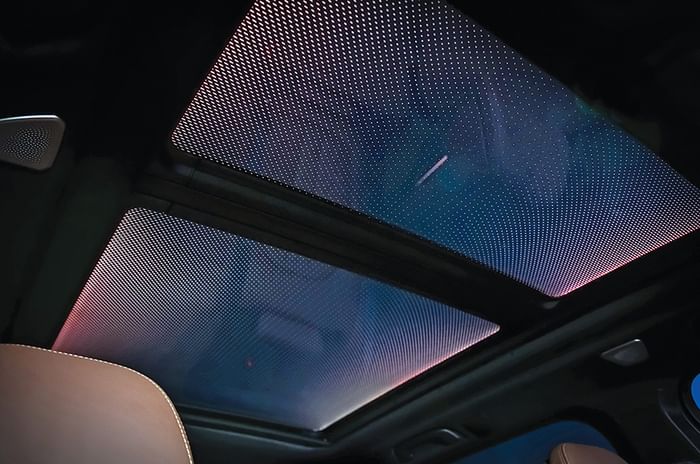
The X5’s cabin has been completely transformed with an all-new design that looks bang up to the minute. The good old handbrake lever is replaced by an electronically controlled switch; it not only looks neater but also frees up space in the centre console for larger cupholders, which can be cooled and heated. The centre console cover, with its metallic finish, looks superb and, in fact, the overall quality in the new X5 has taken a big leap ahead – that slightly industrial ambience of the current car isn’t there anymore.
The choice of materials like glossy piano black surfaces, metallic finishes, richly textured leather plastics, and plush leather trim emanates a class-best level of luxury. However, it’s the attention to detail that genuinely stands out and lifts the interior ambience to a different level. The redesigned iDrive rotary controller has crystals embedded in it to give a jewel effect but the pièce de résistance is the optional crystal glass gear knob, which would look more appropriate on your mantlepiece at home than in a car. This fantastic bit of detailing is truly a work of art.
The big change is an all-new dashboard, which gets two massive 12.3-inch digital screens, mounted end to end, that effectively replaces all the analogue dials. The infotainment touchscreen is now far more intuitive to use and comes with sharper graphics and a faster response.
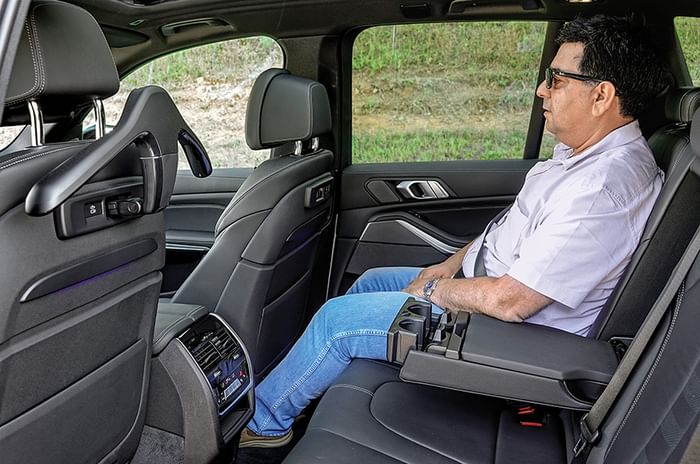
Of the same size is the digital instrument cluster, which could come as a bit of a shock to BMW purists. The classical, round dials are done away with and instead the speedometer and tachometer have morphed into odd-looking arcs (with a non-linear scale) pushed to the sides of the screen, leaving the centre display free for navigation maps and other vehicle data. This decidedly un-sporty-looking design that could belong in any Japanese (or even Korean) luxury car, clearly gives more importance to where you’re going than how fast you’re driving (or how many revs you’re pulling). In this instance, BMW has traded a bit of its sportiness for convenience – possibly because that’s what customers in its core markets like China and America really want. However, I can’t help but think that BMW has missed a trick here and should have taken some cues from Audi’s highly customisable and sporty-looking Virtual Cockpit display.
Strengthening the X5’s luxury credentials are the seats that can now be optioned with Vernasca leather (BMW’s familiar Merino leather is standard), and are far more cosseting than before. The front seats are generously bolstered, and again, designed for large people, while the space in the back row is very impressive too. Apart from the ample head- and legroom, it’s the optimal height of the seat base that translates to a comfortable and upright sitting position. There’s also enough width and the transmission tunnel doesn’t intrude into the cabin, so sitting three abreast is pretty comfortable.
The X5 also gets an optional third row of seats (we got to experience it on a static display car). The middle row can be electrically moved forward and folded down to access the back, but, quite frankly, it’s not easy to get into the third row and space here is quite tight as well. The third row can be folded flat (electrically again) to enhance luggage space, but to accommodate the extra pair of seats, the spare tyre has been chucked out. On the regular five-seater, however, you do get a spare tyre; so when owners spec their X5, they will have to choose between the versatility of seven seats or the peace of mind and security of a spare tyre. Of course, the X5 comes with run-flat tyres – a technology first championed by BMW – but we know how impractical they are on rough Indian roads.
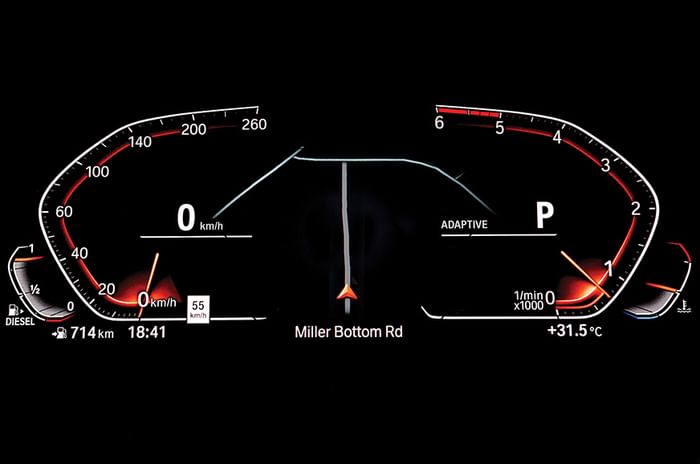
The electrically operated split tailgate opens with a useful ledge that makes loading heavier items a lot more convenient. The 650-litre luggage area in the five-seater X5 is not the most voluminous but it is good enough for a family on a long weekend.
The new X5 is fully loaded and comes with a wide array of features and equipment. There’s a now a four-zone climate control system, the leather seats can be heated (standard) and cooled (optional), and even the cupholders can electrically heat or cool your drinks. A gimmicky feature is the ‘Dynamic Interior Light’ function; it uses the car’s ambient lighting to flash alerts to the driver for things like an open door when the engine is running or an incoming phone call.
A 1,500W Harman Kardon audio system is standard but audiophiles can plum for the optional 20-speaker B&W system which, with the massive panoramic sunroof (30 percent bigger), promises to serve up an open-air concert experience.
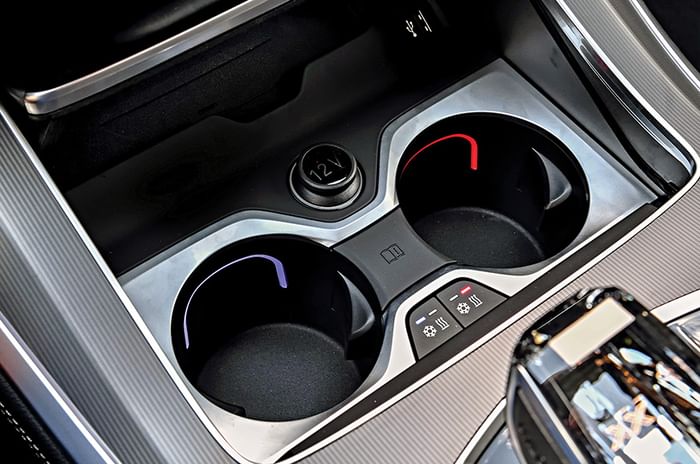
Connectivity is driving the future of the car and the new X5 is in the race with a wide suite of connected features bundled in. In addition to Apple CarPlay and Android Auto, which is pretty much standard these days, the X5 also gets BMW’s ConnectedDrive services that gives information on parking sports and real-time traffic, and seamlessly connects the car to your devices. With BMW’s connected services you can access a lot of the car’s data from your phone and even fire up the engine.
Additionally, the SUV is equipped with wireless charging, a WiFi hotspot, dual USB ports and a 20GB hard disk for the multimedia system that drives a range of apps. There’s a sophisticated camera system too that allows you to see each of the X5’s wheel on the screen. This is quite useful when off-roading because you can see if you’re about to hit a boulder or any obstacle and take corrective action.
There’s a fair bit of active safety tech in the new X5. Over and above the now commonplace pedestrian detection, blind spot and pre-collision warning systems (called Active Driving Assistant), you get a higher level of Advanced Driver Assistance Systems (ADAS) if you opt for the Driving Assistant Professional Package. The lane-keeping assist worked quite well and the system also changes lanes automatically by steering the car into an adjacent lane when a gap opens up. Taking autonomous driving to near Level 3 is the Traffic Jam Assistant, which allows hands-free and pedal-free driving on controlled highways and at speeds under 60kph. I didn’t get a chance to see how well it worked and it’s highly unlikely that this advanced feature will be available on the India-spec car.
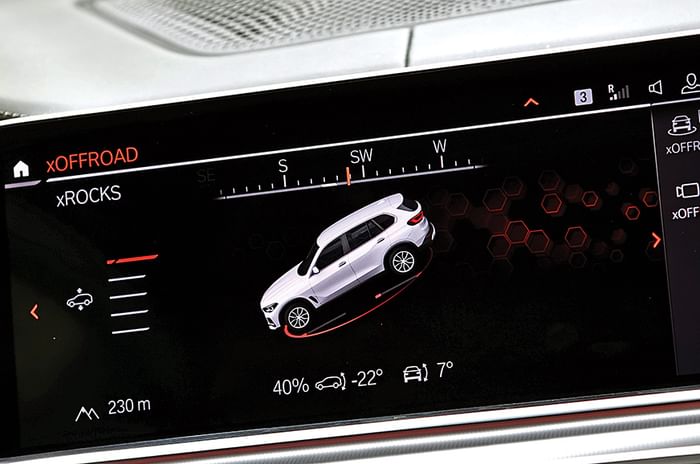
WAY FORWARD
The X5 has been launched internationally with four engine options, but for India, the choice will be limited to just a pair – the 30d diesel and 40i petrol. A brief drive in the 40i on the off-road track revealed an engine that is smooth and punchy. Producing 340hp and 450Nm of torque from as low as 1,500rpm, this 3.0-litre, straight-six unit immediately impresses with its pulling power.
However, it’s the 30d that will be the biggest seller, and hence it’s with this variant that I spent the most time. The familiar 3.0-litre, straight-six, variable geometry, single-turbo diesel engine is largely a carry-over from the current car but it has been tweaked to produce even more grunt. The power output of 265hp is a marginal increase of 10hp, but torque is bumped up by a healthy 62Nm, to 620Nm.
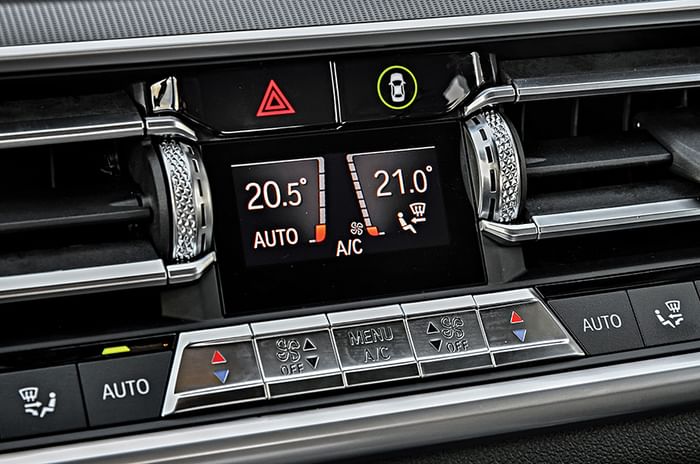
However, when driven flat out, the new X5 doesn’t feel as quick as the 0-100kph time of 6.5sec suggests, even though it has a slightly more favourable power-to-weight ratio. It’s the way the engine delivers its power and torque to comply with the stringent Worldwide harmonised Light vehicle Test Procedure (WLTP) and Real Driving Emissions (RDE) that has greatly influenced the new engine’s power delivery and drivability. Gone is that sudden spike of torque which gave you a kick in the kidneys (your own, not the X5’s!) and what you get instead is a slower, more linear build-up of power. BMW’s powertrain boss Reinhardt Brandstatter admits that to meet tougher WLTP regulations, the ECU has had to be recalibrated, which ‘has had an effect on the power delivery.’ This is not to say that the X5 is slow. It still whisks you to illegal speeds in a jiffy, and there’s always a surfeit of power on tap, which makes overtaking and cruising utterly effortless. It’s just that the characteristic mid-range punch of this engine has been softened. Interestingly, this mellower state of tune is only on engines tuned to meet the WLTP standards, but for the Indian market, the X5, which goes on sale in mid-2019, will come with a BS-VI-compliant diesel. Brandstatter assures us that BS-VI engines will offer the same peaky power delivery of the current car.
The ZF-sourced 8-speed automatic is still one of the best in the business and complements the engine really well. Shifts are quick, seamless and in Sport mode, it holds onto gears right up until the 5,000rpm redline, accompanied by a loudspeaker-piped sporty diesel soundtrack, which I have to say I quite liked and isn’t as artificial as many say.
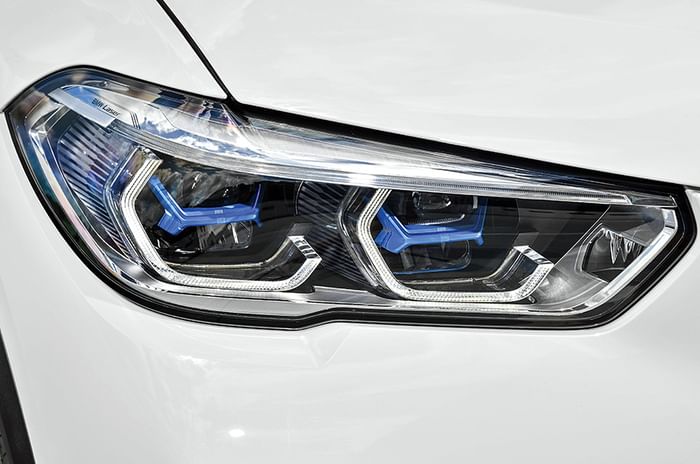
Refinement is another area where the X5 has taken a big leap forward. Not only is the engine remarkably quiet, especially at idle, but there’s also hardly any tyre noise either. The gruff engine note, a signature of BMW diesels, has been nicely muted. The X5’s ride and handling has been finely honed as well and it’s quite amazing how agile and responsive through the bends this 2.1-tonne SUV feels. The steering is a touch quicker, which makes direction changes a lot faster. However, at the same time, BMW has dialed in an initial touch of understeer to act as a safety net for the average driver. Press on harder and the X5 does tighten its line and feels delightfully neutral. The steering is responsive and accurate but feels a touch inconsistent, and the overall feel isn’t that of BMWs of old. However, the average owner isn’t going to push the X5 hard, so for most purposes, and steering foibles apart, this big SUV is sporty enough and a delight to handle.
The air springs may be just single chamber but they deliver an exemplary ride despite the thin sidewalls the 21-inch alloys sit on. It’s only sharp edges that catch it out and thump through into the cabin. So, for rutted Indian roads, it would be wiser to spec the X5 with the standard 20-inch wheels.
A short drive on an off-road course highlighted the X5’s off-road credentials, which is pretty impressive. It can’t rock-climb like a Land Rover but with a suspension that can be jacked up by 80mm, a lockable rear differential and tough underbody protection, the X5 can go where the previous one never could; this again adds a layer of versatility for this all-purpose SUV.
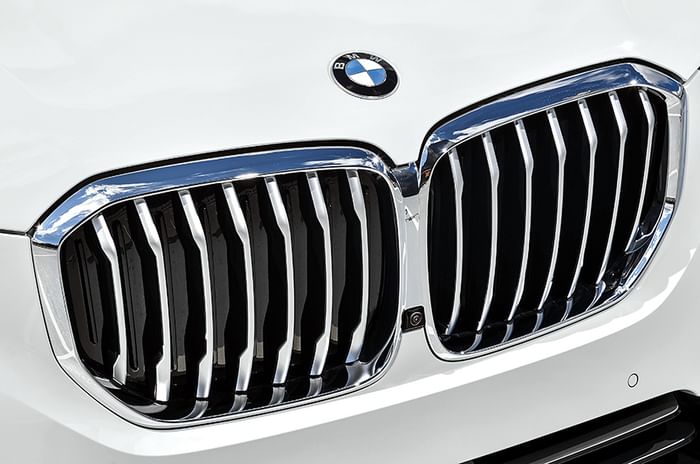
ALL-ROUNDER
It’s the X5’s versatility that makes it a great all-rounder. It’s spacious, well-equipped, refined and very comfortable. The cabin has been completely revamped and it feels more luxurious than before. There’s no doubt that the new X5 is a big leap over the current model in many ways, but in the quest to make it even more upmarket and luxurious, it has lost a bit of its sportiness along the way.
Tech Specs 
Copyright (c) Autocar India. All rights reserved.


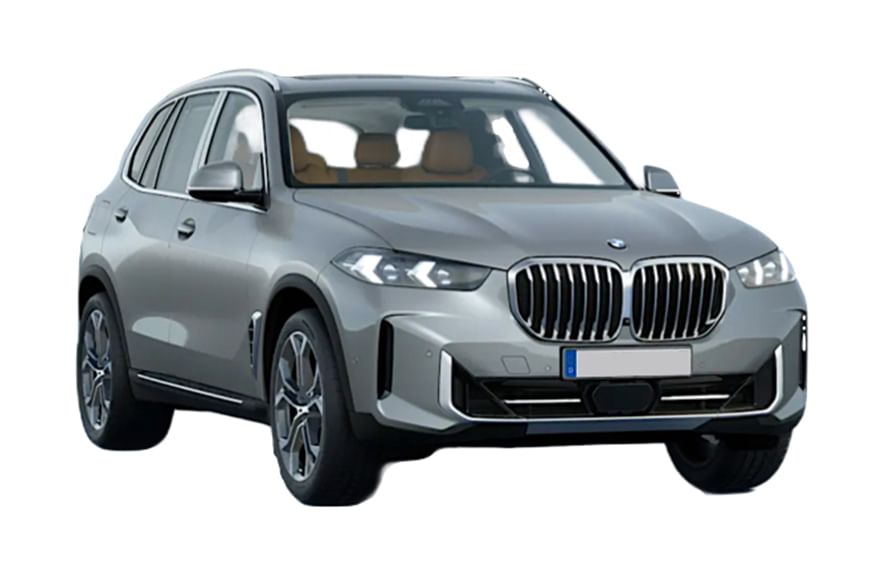






 Price
Price Engine
Engine Body
Body Suspension
Suspension Dimensions
Dimensions
Comments
Member Login
Personal Details
No comments yet. Be the first to comment.